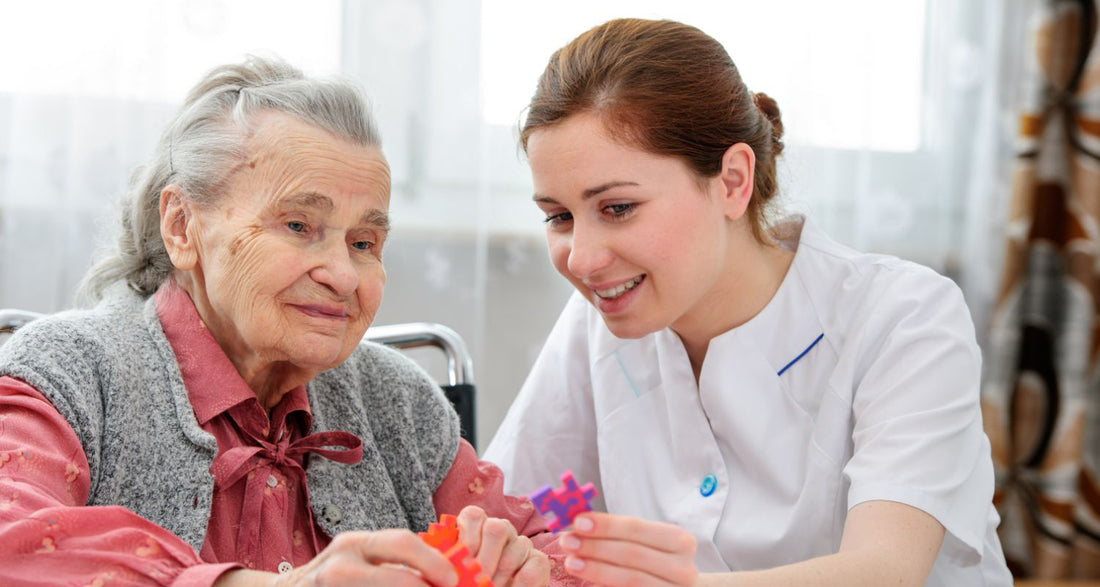What is Dementia?
Dementia is not a specific disease; rather, it is a general term that describes a variety of symptoms related to cognitive decline including memory loss and impaired thinking, reasoning, and problem-solving abilities. People with dementia experience a progressive loss of cognitive function that interferes with their daily lives and activities and leads to behavioral and personality changes.
Dementia can affect anyone at any time in their lives but is most common among adults age 65 years or older. The symptoms of dementia range from mild to severe and progress over 7 stages.
Understanding the Dementia Stages
An estimated 55 million people worldwide live with dementia, most of whom are older adults. Dementia symptoms progress over 7 key stages and become more severe over time. However, dementia affects everyone differently, making it hard to predict how the condition will change over time.
If you know someone with dementia, it is very important to learn about the different stages of cognitive decline. This will help you to understand your loved one’s needs and how they are likely to change over time and to effectively prepare for their future care.
What are the Common Types of Dementia?
There are several different types of dementia. The most common form of dementia is Alzheimer’s disease, thought to be caused by the build-up of proteins in the brain called amyloid plaques and tau tangles. Other forms of dementia include:
- Frontotemporal dementia; a rare type of dementia that typically develops in people under the age of 60.
- Lewy body dementia; a form of dementia caused by a build-up of Lewy-bodies in the brain. Lewy-bodies are proteins that accumulate in neurons (AKA, brain cells).
- Vascular dementia is caused by damage to blood vessels in the brain, which restricts the flow of blood and oxygen to the brain.
- Mixed dementia; a combination of two or more different types of dementia.
Stages of Dementia and Their Symptoms
Dementia is an irreversible illness that progresses over 7 main stages. Throughout these stages, people with dementia experience a variety of symptoms that start mild and become more severe over time.
Mild or Early-Stage Dementia
In the early stages of dementia, symptoms are usually mild and may be overlooked or dismissed as normal forgetfulness. Stages 1-3 are generally known as the ‘pre-dementia’ stages.
Early Stage 1: No Cognitive Decline
In early stage 1, dementia patients still have normal cognitive function. They do not have any significant cognitive impairment or memory problems.
Early Stage 2: Age Associated Memory Impairment
Early stage 2 is typically characterized by occasional forgetfulness. Most commonly, this includes:
- Forgetting familiar names
- Misplacing personal items
- Difficulty finding the right words for things
Mild memory loss is considered a normal part of the aging process and isn’t necessarily a sign of dementia. Age-related cognitive decline is virtually indistinguishable from mild dementia, so these early signs are often overlooked.
Moderate or Mid-stage Dementia
In mid-stage dementia, cognitive decline becomes more pronounced. Problems with the patient’s memory, thinking, and communication skills become progressively worse, and they may experience delusions and hallucinations. This is typically the longest stage of dementia and lasts about two to four years.

Mid-stage 3: Mild Cognitive Impairment
In mid-stage 3, dementia patients start to show clear symptoms of cognitive impairment. Warning signs include:
- Getting lost easily
- Poor work performance
- Difficulty retaining information
- Frequently losing important possessions
- Difficulty concentrating
- Forgetting the names of close friends and family members
These symptoms are often severe enough to interfere with the patient’s day-to-day life and activities, which can cause anxiety and depression. People with stage 3 dementia symptoms are advised to seek assessment from their doctor.
Mid-stage 4: Mild Dementia
Stage 4 dementia is often characterized by:
- Difficulty recognizing faces and people
- Difficulty recalling facts about personal history
- Decreased ability to complete day-to-day tasks (such as managing finances or arranging appointments)
- Forgetting recent events
- Decreased knowledge of current events
- Disorientation
- Changes in personality and mood
In this stage people with dementia may become socially withdrawn, sometimes in a bid to deny or hide their symptoms. Patients often avoid challenging situations in order to avoid stress and anxiety.
Mid-stage 5: Moderate Dementia
As dementia progresses and patients enter mid-stage 5, they start to need assistance with their daily activities. However, they are usually still able to complete basic tasks (like eating, using the bathroom, or bathing) without help.
Symptoms of mid-stage 5 dementia include:
- Forgetting major details (e.g., their home address)
- Difficulty with decision making
- Disorientation regarding time and place
Severe or Late-Stage Dementia
Late-stage dementia is characterized by severe cognitive decline. People in the late stages of dementia require a high degree of care, and will eventually lose their ability to communicate.
Late-stage 6: Moderately Severe Dementia
Symptoms of cognitive decline become more severe as patients enter mid-stage 6 of dementia. Their memory and thinking skills are heavily impaired, which can manifest in the following symptoms:
- Difficulty remembering the names of key people (such as children, a spouse, or primary caregivers)
- Lack of knowledge of all recent events and experiences
- Difficulty remembering early life events
- Difficulty counting backwards or forwards to 10
- Lack of awareness of surroundings, time, or place
- Inability to travel without assistance
- Wandering
- Difficulty sleeping
- Delusions and hallucinations
- Obsessive-compulsive behaviours
- Aggression and agitation
People with moderately severe dementia are typically unable to live unassisted and require full time care.
Late-stage 7: Severe Dementia
Late-stage 7 is the final and most severe stage of dementia. Signs that a patient has entered stage 7 include:
- Loss of motor skills
- Loss of verbal skills
- Inability to walk, eat, or use the bathroom unaided
By the time a person develops late-stage dementia, they are usually nearing the end of their life. End-of-life care may be required when the patient starts to experience the following symptoms:
- Significantly reduced appetite and weight loss
- Difficulty swallowing
- Frequent infections
- Significantly reduced mobility
- Frequent falls
- Reduced communication
- Becoming more withdrawn
- Increased agitation and/or restlessness
- Excessive sleeping
- Seeming drowsy or unaware
- Incontinence
- Needing assistance with most or all daily activities
Understanding Progression: Dementia is Not a Linear Process
All forms of dementia are progressive, meaning the symptoms get worse over time. However, dementia does not progress at the same rate in every patient. The rate of dementia progression depends on several facts, including:
- Physical make-up
- Support available to the patient
- Emotional resilience
Learning about the stages of dementia can help caregivers to understand the illness better, but it is not a reliable way of predicting how an individual’s symptoms will progress. This is because cognitive decline is not a linear process. Instead, patients often experience periods of stability followed by an accelerated worsening of symptoms.
Communicating With a Person Throughout Different Stages of Dementia
Difficulty communicating is a common symptom of dementia, so it’s important for friends and family members to adapt their communication style accordingly. Dementia affects everyone differently, so the most effective communication techniques will depend heavily on the individual.

Communicating With Someone Who Has Early-Stage Dementia
People with early-stage dementia have mild symptoms and are usually able to carry a conversation. However, they may have memory impairment that causes them to repeat stories or forget details. At this stage, the key to successful communication is to treat the person with patience, respect and understanding. This involves:
- Not excluding people with dementia from conversation
- Speaking directly to the person (rather than their caregiver)
- Not making assumptions about the person’s abilities based on their dementia diagnosis
- Taking time to listen to the person without interrupting
- Asking about their preferred method of communication (e.g., face-to-face, phone calls, or messaging)
Communicating With Someone Who Has Mid-Stage Dementia
The middle stage of dementia is often the longest and is characterized by progressive memory loss and problems with reasoning, thinking, and problem-solving. People with mid-stage dementia often have more difficulty communicating than those in the early stages. It is important to be patient, and use the following tips to make communication easier:
- Speak slowly and clearly
- Maintain eye contact
- Offer reassurance
- Ask one question at a time, and give them plenty of time to respond
- Ask ‘yes’ or ‘no’ questions
- Avoid criticizing or correcting
- Avoid arguments
- Give visual cues
- If verbal communication seems confusing, try using written notes
Communicating With Someone Who Has Late-Stage Dementia
The late stages of dementia are characterized by severe symptoms, and some patients lose their ability to speak. Non-verbal communication (such as eye contact, gestures, and facial expressions) is very important in the final stages of the illness. Other tips for communicating with someone who has late-stage dementia include:
- Identify yourself at the start of communication
- Encourage non-verbal communication
- Use touch, sight, sound, smell, or taste as a form of communication
- Consider the emotions behind words and sounds
Conclusion
The symptoms of dementia become more severe as the illness progresses, and patients require different levels of care depending on what stage they are in. Understanding the 7 stages of dementia is very important for friends, family members, and caregivers.
The symptoms of early-stage dementia are often overlooked but, the sooner dementia is recognized, the sooner treatment can begin. Learning about the stages of dementia also helps those closest to the patient to prepare for their future care.
FAQ
At What Stage Do Dementia Patients Forget Family Members?
People with mid-stage dementia may have trouble remember names and faces, but patients do not typically forget family members until they enter the late stages of the illness.
At What Stage Of Dementia Does Sundowning Occur?
Sundowning (i.e., changes in behavior that occur after sunset) can happen at any stage of dementia. However, this symptom is more common in the mid and late stages of the illness.
At What Stage Of Dementia Does Aggression Occur?
Aggressive behavior is most common in the later stages of dementia, but can happen at any time over the course of the illness.
What If A Dementia Patient Has A Sudden Change In Symptoms?
Dementia symptoms worsen as the disease progresses, but a sudden change in symptoms may require medical treatment. If this happens, consult the patient’s doctor immediately.
How Long Does Each Stage Of Dementia Last?
Typically, the early stage of dementia lasts around two years; the mid-stage of dementia lasts two to four years, and the final stage can last anywhere from several weeks to several years.
How Can You Tell What Stage Of Dementia A Person Is In?
The stages of dementia are characterized by steadily worsening symptoms. Those with mild symptoms (i.e., occasional forgetfulness) are in the early stages of the condition. Those with moderate symptoms (more pronounced memory loss and other signs of cognitive decline) are usually in the mid-stages. Those with severe symptoms (i.e., inability to complete daily tasks or communicate) have late-stage dementia.
What Is The Worst Stage Of Dementia?
People in the last stages of dementia (known as late-stage or severe dementia) usually require assistance with most daily activities. In this stage, patients typically have difficulty communicating.
References
- https://www.cdc.gov/aging/dementia/index.html
- https://www.alz.org/alzheimers-dementia/facts-figures
- https://www.who.int/news-room/fact-sheets/detail/dementia
- https://www.alzheimers.org.uk/sites/default/files/pdf/factsheet_the_progression_of_alzheimers_disease_and_other_dementias.pdf
- https://www.nia.nih.gov/health/what-is-dementia#
- https://www.ncbi.nlm.nih.gov/books/NBK566126/table/Ch1-t0001/
- https://alzres.biomedcentral.com/articles/10.1186/alzrt91#
- https://www.dementia.org/stages-of-dementia
- https://www.alzheimers.org.uk/about-dementia/symptoms-and-diagnosis/how-dementia-progresses/middle-stage-dementia
- https://www.alz.org/help-support/caregiving/stages-behaviors/middle-stage
- https://alzheimer.ca/en/help-support/im-caring-person-living-dementia/what-expect-persons-dementia-progresses
- https://www.verywellmind.com/the-7-stages-of-dementia-symptoms-and-what-to-expect-6823696
- https://neurosciencenews.com/mci-dementia-alzheimers-patterns-2676/
- https://www.alz.org/help-support/caregiving/daily-care/communications#
- https://www.medicalnewstoday.com/articles/how-long-does-the-aggressive-stage-of-dementia-last#
- https://www.alzheimers.org.uk/sites/default/files/pdf/factsheet_the_progression_of_alzheimers_disease_and_other_dementias.pdf

